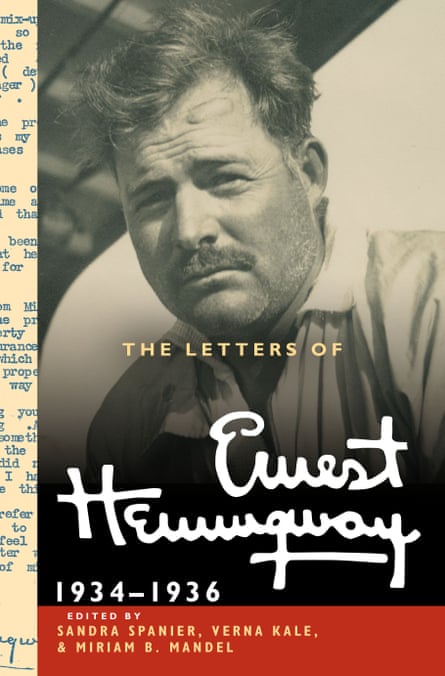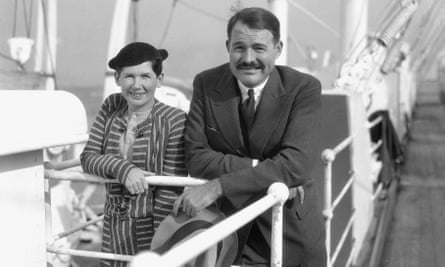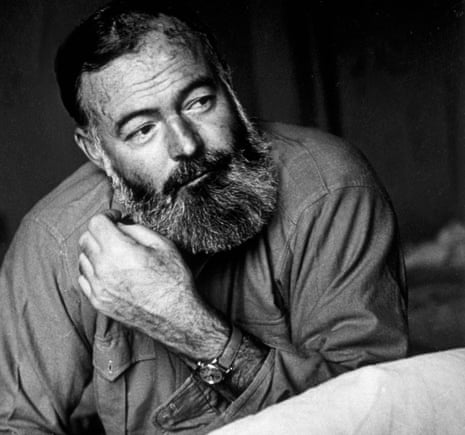He cultivated a hard-drinking macho image, with a taste for big-game hunting and a love of bullfighting, but Ernest Hemingway had a generous and thoughtful side that is revealed in previously unpublished letters.
In the decade after he made his name with A Farewell to Arms, his 1929 war novel, his correspondence shows that he repeatedly offered advice and encouragement – as well as insights into his own craft – to aspiring young novelists.
In a letter from 1934, he wrote: “The real secret in writing a novel is to keep inside of your action all the time like a horse. Don’t let the damned horse run away on you when you are going to have to keep racing him forever. And always stop at an interesting place when you still know what is going to happen.
“Then you can go on from there the next day and the next and etc. Never write yourself out in those bursts. It is just like making a 300-mile race a succession of runaways. Do a certain amount every day or every two days and always stop where it is interesting and while you are going good.”

While praising achievements, he was also brutally honest in his criticism: “I suppose you’d rather have me be perfectly frank so will be – You can’t write a novel that way.”
The letter’s recipient was Arnold Gingrich, who wanted to become a published novelist. He was then a young, up-and-coming editor who had launched Esquire magazine in 1933, with Hemingway contributing features on his hunting and fishing adventures.
In 1936, Hemingway also wrote to an unknown budding writer, Joseph Hopkins, telling him: “Listen. If you die you’re dead. And if you can write some more good stories you’ll never die. You have enough talent for me to fool around trying to get you published.”
He recommended one of Hopkins’s stories to Gingrich, who published it.
The correspondence will appear in the forthcoming book, The Letters of Ernest Hemingway: Volume 6, edited by Sandra Spanier, Verna Kale and Miriam B Mandel, and published by Cambridge University Press.
The latest of 17 planned volumes, it spans 1934 to 1936, with 366 letters to 116 recipients. They cover everything from his experimental nonfiction book Green Hills of Africa to his big-game fishing.
Spanier, professor of English at Penn State University, said of his letters to aspiring writers: “Hemingway’s swaggering, cantankerous persona is well known. This is a more generous and reflective side of him. He took writing very seriously.
“Gingrich was his most frequent correspondent in this period. The letters show that Hemingway is reflective and wise, offering ideas about what’s going to be useful to a writer. These are really great letters. They show a fresh side of Hemingway for people who have stereotypical views of him which he sort of perpetuated himself.”
after newsletter promotion

When Gingrich’s book – Cast Down the Laurel – was finally published, Hemingway wrote to him in 1935 about the “marvellous press” it had received: “There is no doubt but what you are a big shot now and of Literary Importance. How does it feel? But for Christ sake don’t let the reviews mean a god-damned thing to you or it will take you from two years to always to get over it. The book is exactly the same as it was when you finished it and it is from there that you have to go on writing … You are an intelligent guy Arnold with a lot of talent.”
Spanier said that while Hemingway is not widely recognised for his sense of humour, the letters show that he could be “very funny”. “Hemingway had become passionate about fishing for giant marlin and tuna, and spent much of the period in the waters between Key West, Cuba and Bimini, in the Bahamas, fishing aboard his beloved new boat, Pilar.” In a 1935 letter to his old friend and fellow fisherman, the American painter Henry Strater, he ridiculed the idea of appropriate attire for a fishing expedition just because Bimini then attracted the wealthy fishing and yachting set.
He wrote: “Don’t know what we will need good clothes for. Whites are good enough to call on anybody. No reason why anybody should snoot us …
“We’re going for a holiday and to catch fish and no need to be dressed up. Much smarter (vogue sense of the word smart) not to be. I don’t know anybody in Bimini. Other anglers no matter how millioned more interested in what you catch than in what you wear. I’ll shave for anything over 500 pounds; but not for anything under.”
